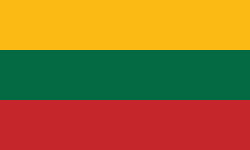Neringa Municipality (Neringa)
Neringa or Neringa Municipality (Neringos savivaldybė) is a municipality of Klaipėda County in westernmost Lithuania, comprising several villages in the Curonian Spit. In terms of population, it is the smallest municipality of the country.
The name of the city is relatively new and is not found in old scriptures in this form. The name is derived from a German word Neringe, Nerunge, Nehrung which itself is a derivative of a curonian word nerija meaning a long peninsular spit.
Until the 2000 Lithuanian municipality reform, it was known as Neringa City, although there was never a true "city" there. It was made a city in the Soviet Union in 1961 by formally combining 4 settlements into one administrative unit.
The name of the city is relatively new and is not found in old scriptures in this form. The name is derived from a German word Neringe, Nerunge, Nehrung which itself is a derivative of a curonian word nerija meaning a long peninsular spit.
Until the 2000 Lithuanian municipality reform, it was known as Neringa City, although there was never a true "city" there. It was made a city in the Soviet Union in 1961 by formally combining 4 settlements into one administrative unit.
Map - Neringa Municipality (Neringa)
Map
Country - Lithuanian_Soviet_Socialist_Republic_(1918–1919)
 |
 |
| Flag of Lithuania | |
Germany had lost World War I and signed the Compiègne Armistice on 11 November 1918. Its military forces then started retreating from the former Ober Ost territories. Two days later, the government of the Soviet Russia renounced the Treaty of Brest-Litovsk, which had assured Lithuania's independence. Soviet forces then launched a westward offensive against Estonia, Latvia, Lithuania, Poland and Ukraine in an effort to spread the global proletarian revolution and replace national independence movements with Soviet republics. Their forces followed retreating German troops and reached Lithuania by the end of December 1918.
Currency / Language
| ISO | Currency | Symbol | Significant figures |
|---|---|---|---|
| EUR | Euro | € | 2 |
| ISO | Language |
|---|---|
| LT | Lithuanian language |
| PL | Polish language |
| RU | Russian language |















